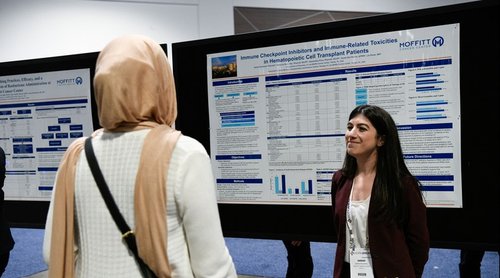Guidelines, Standards, and Summaries

Further Defining the Scope of Hematology/Oncology Pharmacy Practice
In an effort to describe the evolution of oncology pharmacy and promote a better understanding of the profession, HOPA has updated its 2013 Scope of Hematology/Oncology Pharmacy Practice. Further Defining the Scope of Hematology/Oncology Pharmacy Practice (PDF) details the roles, responsibilities, tasks, and competencies of hematology/oncology pharmacists in various practice settings. Because advances in the field are occurring rapidly and because oncology pharmacists may enter the profession by a number of pathways, HOPA also explores the importance of board certification for oncology pharmacists serving in different roles and positions.
Oncology Pharmacy Technician Guidelines
In collaboration with ASHP, HOPA members have published ASHP-HOPA guidelines on the roles and responsibilities of the pharmacy technician in ambulatory oncology care (PDF). These guidelines address the rapid evolution of ambulatory oncology practice in the past decades.
Dose Rounding of Biologic and Cytotoxic Anticancer Agents
Drafted by the a group of HOPA members and experts put together by the HOPA Standards Committee, this position statement document (PDF) is intended to serve as a guideline for use during the developing of dose-rounding policy as well as to support and validate existing policies.
ESMO: Management of Toxicities from Immunotherapy
In 2017, the European Society for Medical Oncology published the Management of Toxicities from Immunotherapy in the Annals of Oncology. Immunotherapy is an essential component of cancer care and expands the treatment of possibilities for patients. These clinical practice guidelines offer an overview of the main immune-related adverse events and include recommendations for their management.

NCCN Mobile Apps for Smartphones and Tablets
The National Comprehensive Cancer Network® has created a series of Mobile Apps to help healthcare professionals and patients alike. The Virtual Library of NCCN Guidelines® App assists healthcare professionals in the implementation of the guidelines. NCCN Guidelines for Patients® was created to help patients with cancer talk to their physicians about treatment. The NCCN Reimbursement Resource App gives users the ability to search for available resources and payment assistance programs.
Clinical Pharmacogenetics Implementation Consortium (CPIC) Guidelines
The HOPA Board and Standards Committee in collaboration with clinical experts have reviewed the following Clinical Pharmacogenetics Implementation Consortium (CPIC) Guidelines and have endorsed their use. Pharmacogenomics enable individualization of therapy to patients. These guidelines offer assistance with interpretation of pharmacogenomic testing, when it is available, to optimize therapy.
CPIC Guideline for Allopurinol and HLA-B
CPIC Guideline for Opioids and CYP2D6, OPRM1, and COMT
CPIC Guideline for Ondansetron and Tropisetron based on CYP2d6 genotype
CPIC Guideline for Rasburicase G6PD
CPIC Guideline for Tacrolimus and CYP3A5
CPIC Guideline for Tamoxifen based CYP2D6 genotype
CPIC Guideline for Thiopurines and TPMT and NUDT15
CPIC Guideline for Voriconazole and CYP2C19
Standards
Guiding Principles for State Policy on Pharmacy Personnel-Administered Vaccines
HOPA participated in a work group with representatives across multiple medical associations with the goal of developing principles for state policy around personnel-administered vaccines and navigating evolving federal processes, recommendations, and advisory structures. The document presents a set of general guiding principles that can be used to shape policy modernization efforts within each state's unique legislative and regulatory framework and, in the end, improve access to key vaccines. Click here to view the document.
Best Practices for the Management of Oral Oncolytic Therapy: Pharmacy Practice Standard
The HOPA Standards Committee organized a work group of oncology pharmacist specialists to create a pharmacy practice standard for the management of oral oncolytic therapy that describes the pharmacist’s role on the cancer care team, provides examples of practice tools and resources, summarizes current data related to outcomes, and discusses opportunities to enhance the care of patients with cancer who receive oral oncolytic therapy. The standard was published in ASCO’s Journal of Oncology Practice and is available online here.
HOPA Investigational Drug Service Best Practice Standards

The HOPA Investigational Drug Service Best Practice Standards (PDF) is the first of its kind to provide best practice standards and guidance for pharmacists and institutions to conduct clinical trials. This document emphasizes the critical role of the pharmacy in the investigational drug service, from protocol concept to close-out. This document provides a foundation for pharmacy to be involved very early in the protocol development and review, to ensure the trial meets institutional medication guidelines, is executed efficiently, and adheres to all regulations and standards.


